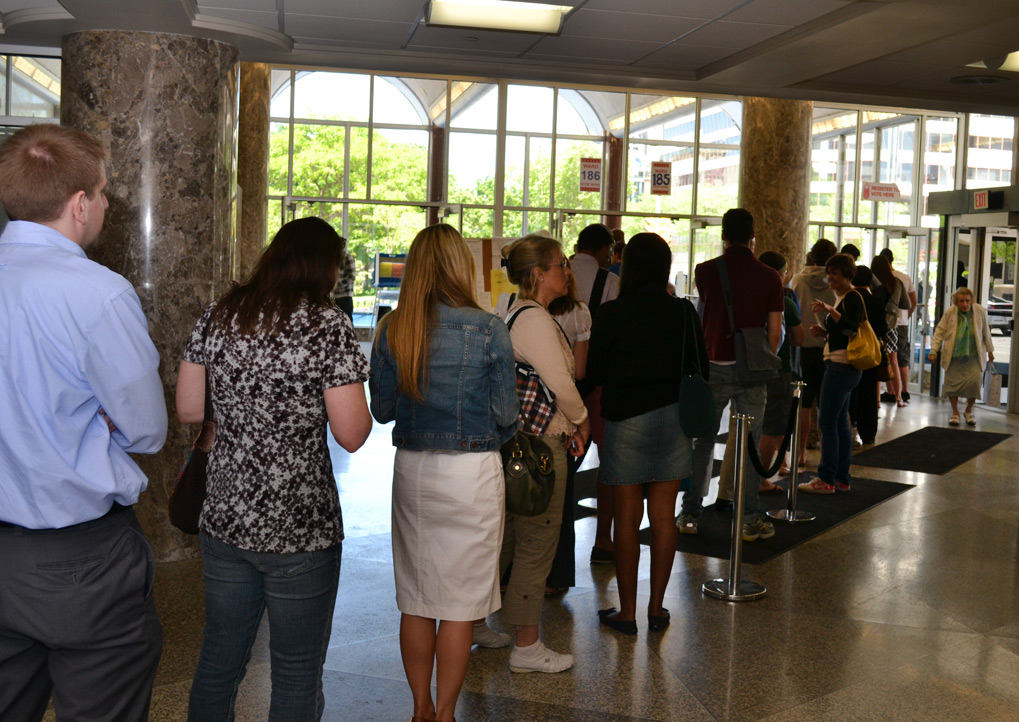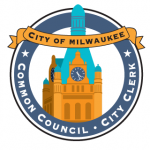Why Voter ID Education Needed
Confusing law is disenfranchising voters, education would help assure fair elections.
In April Wisconsin held a high turnout election, which is terrific. But the final count could have been even higher. State officials have a chance to boost voter participation and make voting smoother for all by committing a modest amount of funding for voter education.
The League of Women Voters urged the Government Accountability Board last week to request funding to promote its voter ID education campaign, and we are delighted they voted to do so. A vigorous state voter education campaign is sorely needed as we prepare for November 8 when one million more voters are expected to turn out.
People who do not have an acceptable photo ID on Election Day may cast a provisional ballot, which is counted only if the voter provides the ID to election officials by end of the week. According to preliminary figures 375 provisional ballots were issued on April 5, of which 108 were counted. We have no idea how many people did not even try to vote under the new ID requirements.
In Deforest, a disabled Vietnam veteran in a wheelchair had proof of residence and an expired Wisconsin driver’s license, allowing him to register to vote. Then he was denied a regular ballot because his driver’s license expired shortly before the Nov. 4, 2014 cut-off. The clerk did all she could to assist him to no avail. He accepted a provisional ballot but said he was sure he could not arrange transportation, first to the DMV and then to his clerk’s office by the end of the week.
A community leader in Madison who is well informed and active in civic affairs moved some time ago and updated her address in the DMV database. She had already registered and voted at her new polling place, but on the day of the February primary election she remembered that her new address was not on driver’s license. She actually could have voted but didn’t even try because she thought her ID needed that current address.
These citizens were properly registered, but they were tripped up by not knowing the details of a confusing new law.
Some state officials have said that the League is out of order in calling for voter education after having challenged the photo ID law in court. We are proud to have been one of the organizations that held off implementation of the law for three years. Because of the injunctions no Wisconsin citizen was disenfranchised by the law through 11 elections, nor were there any allegations of voter impersonation.
When the voter ID law went into effect the League added a full-time position, increasing our staff by 50 percent. And we have hundreds of volunteers in our 18 local Leagues working to register and assist voters in complying with a law we opposed. Indeed, voter education has been the League’s mission for almost 100 years.
Now it is time for the proponents of voter ID to do their part and back up their claim that they would never want to prevent any eligible citizen from voting. One way to ensure that doesn’t happen is to fund a statewide voter education campaign. Surely NOT to do so reveals their claim to be just more hollow rhetoric.
Andrea Kaminski is executive director of the League of Women Voters of Wisconsin, a nonpartisan organization that advocates for informed and active participation in government.
Op-Ed
-
Wisconsin Candidates Decry Money in Politics, Plan to Raise Tons of It
 Dec 15th, 2025 by Ruth Conniff
Dec 15th, 2025 by Ruth Conniff
-
Trump Left Contraceptives to Rot; Women Pay the Price
 Dec 8th, 2025 by Dr. Shefaali Sharma
Dec 8th, 2025 by Dr. Shefaali Sharma
-
Why the Common Council’s Amended Budget is Good Policy for Milwaukee
 Nov 20th, 2025 by Alds. Marina Dimitrijevic and Russell W. Stamper, II
Nov 20th, 2025 by Alds. Marina Dimitrijevic and Russell W. Stamper, II























There is substantial evidence that voter education is needed in light of the new voter ID laws.
But a study of the Texas ID requirement by Rice University’s Baker Institute for Public Policy released in August found that many more qualified voters, confused or intimidated by the new rules, have not tried to vote at all.
“What voters hear is that you need to have an ID,” said Mark P. Jones of the Baker Institute, an author of the study. “But they don’t get the second part that says if you have one of these types of IDs, you’re O.K.”
A second study, by the University of California, San Diego, concluded in February that the strictest voter ID laws — those that require an identity card with a photograph — disproportionately affect minority voters.
After Mr. Gallego’s narrow loss in 2014, researchers from the Baker Institute and the University of Houston’s Hobby Center for Public Policy polled 400 registered voters in the district who sat out the election. All were asked why they did not vote, rating on a scale of 1 to 5 from a list of seven explanations — being ill, having transportation problems, being too busy, being out of town, lacking interest, disliking the candidates and lacking a required photo identification.
Nearly 26 percent said the main reason was that they were too busy. At the other end, 5.8 percent said the main reason was lacking a proper photo ID, with another 7 percent citing it as one reason. Most surprising, however, was what researchers found when they double-checked that response: The vast majority of those who claimed not to have voted because they lacked a proper ID actually possessed one, but did not know it.
http://www.nytimes.com/2016/05/02/us/stricter-rules-for-voter-ids-reshape-races.html?hp&action=click&pgtype=Homepage&clickSource=story-heading&module=first-column-region®ion=top-news&WT.nav=top-news&_r=0
I am a poll worker and do not agree with the voter ID law but having to enforce it I saw no one kept from voting. However, many people were kept from voting by the Democratic party’s failure to have qualified, well trained workers at the polls. The polling places in Milwaukee are chaos at best. Milwaukee was short more than 300 poll workers add to that number the people who simply could not handle the job. At my polling place we worked without a break from 6 AM to after 10 PM. We were short workers and two of those who were there and being paid only created further problems. People walked out, never got into the long lines, left after being told they were in the long line or even worse left after finally getting a ballot and not being able to wait in another line simply to mark the ballot and place it into the machine. It is easy to point to the voter ID law but that is not the problem in Milwaukee,chaos at the polls is the problem.This is a problem the Democratic party can solve by recruiting people to work at the polls.I lived in the suburbs for thirty years, worked at the polls and never saw such a mess which is present at the Milwaukee polling places.
We need more education? Never has it happened where the state or any community said, “Hey, we are having an election today.” There has always been multiple months of campaigning and preparation prior to an election. It is called the internet. It is free, yes, even to poor people. http://www.gab.wi.gov/voters is an extremely easy site to navigate with ALL the information any person needs.
– The Minnesota transplant had multiple weeks prior to election day to register. Did that person not know they were from MN and would need a WI ID once they moved here? Were they unaware that an election was happening? Not a valid complaint.
– The disabled vet’s license expired in 2014. The election was in 2016. He had over a year to update his ID. Not a valid complaint.
– The community leader was clearly not as “well-informed” on civics as the article indicated. Does this person not have internet access? Again, not a valid complaint, especially being that the person actually could vote.
A person’s laziness/procrastination and/or stupidity is not disenfranchisement. Unless there is an actual instance of disenfranchisement to point to, please stop whining.
Joe your arguments reflect those of someone who has no idea what they are talking about because they have never experienced any impediments to voting. They reek of the ignorance of the privileged. “I have no trouble voting therefore no one should have any trouble voting. If they do, they are dumb.” Reality proves that you are wrong. Plenty of people face very real obstacles that have nothing to do with being lazy or dumb. Not everyone has Internet access believe it or not, and not everyone has time to spend perusing the Internet. Again, that you have Internet access and time to conduct Internet research is not proof that the same is true for everyone. You seem like a person who lives in a bubble.
Vincent….what are these “very real obstacles” that keep people from voting?
I tried posting a response hours ago but don’t see it yet so I’ll try again. I hope these enlighten you Joe.
http://www.americanbar.org/publications/human_rights_magazine_home/2012_vol_39_/winter_2012_-_vote/barriers_to_the_ballotboxnewrestrictionsunderscoretheneedforvoti.html
https://www.propublica.org/article/wisconsin-voter-id-law-education-campaign-state-hasnt-funded
http://mic.com/articles/139002/new-report-shows-millennial-and-minority-voters-face-huge-obstacles-at-the-polls
http://www.msnbc.com/msnbc/new-year-comes-new-obstacle-voting-texas
http://www.cnn.com/2015/12/09/politics/alabama-dmv-closures-voting-rights/
http://www.azcentral.com/story/news/politics/elections/2016/03/27/why-does-seem-like-s-getting-harder-vote-arizona/82236584/
I have tried to post twice and neither has shown up. I imagine it’s because each has several links. Hopefully they show up so Joe can break out of his bubble.
Why was this law needed in the first place? Glenn Grothman was asked why he thought Cruz or Trump could win in November. Did he say anything about their views or policies? No, he said voter id could make a difference in the election. Pretty damn blatant.
Great…you can copy and paste links (most of which do not apply – requiring training for people who do the registration process or party rules for primary voting)
None of the links provide any obstacles.
I see lots of “obstacles” that all adults (even me) need to do (update licenses, keep ID’s current, change addresses, find out what they need to do to register, prioritize their time, etc). Election days are announced months in advance, so “not having enough time” is not an excuse or an obstacle. Everyone (even the poor and/or disabled and/or working students or any other supposedly disenfranchised group) has enough time to do what needs to be done. If they decide not to take the necessary time to do it, that is not an obstacle. It is a choice. Choosing not to do it in the time required is NOT disenfranchisement.
States and political parties have tremendous resources to overcome all the “obstacles” in information, education, transportation, etc. ID’s for voting are free. Internet is free at public libraries. There are phone numbers for those who do not have access to the internet. Not one of the people mentioned in this original article was disenfranchised.
Again, I ask…..present me with an ACTUAL obstacle, please.
If states have so many resources why not fund voter ID education? The law was changed here in a dramatic way so why shouldn’t there be an educational campaign to let voters know about the major changes?
Again, you have no problem voting so you refuse to believe that anyone else could experience real problems. You obviously did not read anything I linked to considering how quickly you replied. That’s fine. Live in your privileged bubble. You face no obstacles therefore anyone who does is really just lazy and dumb. That’s not ignorant at all. A totally sane worldview.
I responded to your points. You have yet to present an actual obstacle. Making assumptions about me and my life is not an argument, neither is insulting me. Present an obstacle.
It appears that Joe will forever dig in his heels that there is no need to educate voters about the voter ID law. It’s not an insult to speculate that could be because, like Glenn Grothman, he believes the law and its ramifications will indeed bolster GOP prospects in the fall election and beyond. Educating “stupid, lazy and procrastinating” citizens could possibly cut into those potential advantageous margins for the GOP.
Thus, from that view there is absolutely no reason to do any voter education as a public service. Research has shown that seniors, students and minority populations are more likely to have issues about their IDs and also more likely to vote for Democrats.
But Kent’s points about understaffing and chaos at the polls are also extremely troubling. Who will work to ensure that situation is addressed by November?
Another presumptuous post about my political affiliation. It couldn’t possibly be the case that I abhor wasting my money. You asking me to have my tax dollars spent so a “well informed” community leader in Madison can see an ad on a bus or see a commercial that tells her to call a number or go to a website to see if her ID is valid??? Enabling that level of laziness is immoral to me.
Students??? These people are in college! If they cannot figure out how vote, do we need to reconsider college admission policies??? Again, enabling that level of laziness (mental and physical) is an absolute waste of taxpayer dollars. The fact that the other posters on this thread want to enable that laziness is even more troubling. Glen Grothman has his issues, for sure, but he is not the problem. The apathy toward the process is the problem. The whining about the expectation that an adult should take care of adult things (maintaining a valid ID) is the problem. What a low bar of expectation. That low bar is a problem.
Joe, OK it may have been presumptuous to speculate about political affiliation. Perhaps you consider public-information in general a waste of money.
Are you equally bothered by the wasted taxpayer money, and energy, invested in implementing voter ID laws when there has never been any statistically significant voter fraud, esp. that an ID would prevent?